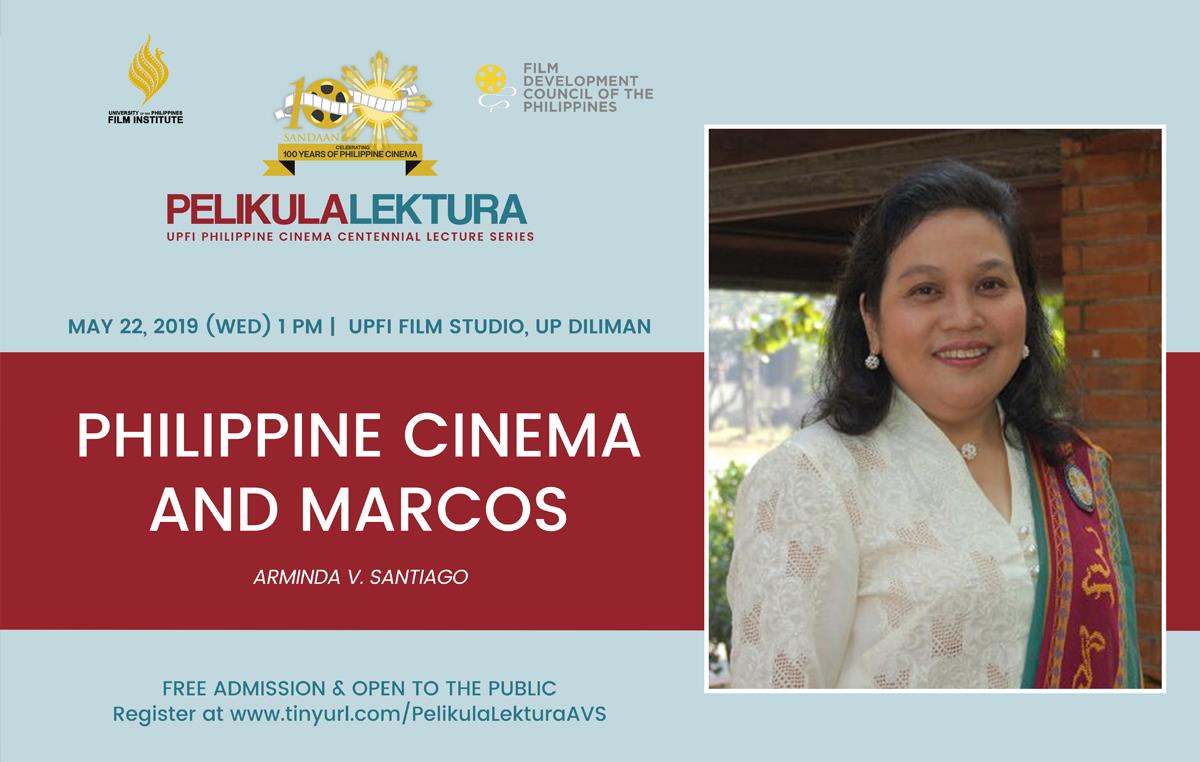
The Pelikula Lektura: UP Film Institute Philippine Cinema Centennial Lecture Series supported by the Film Development Council of the Philippines continues with the Dean of the UP College of Mass Communication Dr. Arminda Santiago —May 22, 2019 (Wednesday) 1PM at the Film Studio, UPFI Media Center, UP Diliman.
Admission is FREE and open to the public. Certificates will be given to non-UP Film Institute students and only upon request.
For interested participants, you may register at
www.tinyurl.com/PelikulaLekturaAVS
—
LECTURE TITLE
Philippine Cinema and Marcos
The Pelikula Lektura: UP Film Institute Philippine Cinema Centennial Lecture Series supported by the Film Development Council of the Philippines continues with the Dean of the UP College of Mass Communication Dr. Arminda V. Santiago —May 22, 2019 (Wednesday) 1 PM at the Film Studio, UPFI Media Center, UP Diliman.
Admission is FREE and open to the public. Certificates will be given to non-UP Film Institute students and only upon request.
For interested participants, you may register at
www.tinyurl.com/PelikulaLekturaAVS
ABSTRACT
Ferdinand Marcos is the Philippines’ President with the longest stay in office and power; having been elected in 1965 until his ouster in 1983, the result of a people’s revolution. His first administration was marked by some improvement in the economy of the country but soon his stay in power deteriorated into corruption, the violation of human rights, and later dictatorship when he declared Martial Law in 1972.
The Philippine movie industry had its first brush with politics during Marcos’s presidential campaign in 1965. The desire for myth building led to a film called Iginuhit ng Tadhana (1965), which gave Marcos his win at presidency. And for his re-election bid, a second film was produced, called Pinagbuklod ng Langit (1969), where he got screen idols Luis Gonzales and Gloria Romero as the first couple. Marcos knew the power of the movies and used it to the hilt to endear himself and Imelda to the Filipino people. Another film Maharlika (1970), was a “full-scale jungle epic along the lines of “Bridge on the River Kwai”. This film depicted Marcos’s heroic deeds in fighting the Japanese Occupation.
The early Marcos years meant an open economy to attract foreign investors as well as his government’s dealings with the International Monetary Fund and the World Bank that put the country in severe debt and economic instability. There was a rise in the urban poor population because of transmigration from the rural periphery into the highly congested urban interior and that gave rise to an increased crime rate and violence. The deteriorating social conditions were clearly visible but public officials turned a blind eye toward this bleak reality and instead devoted their time and energies to political skirmishes and graft and corruption. Sad to say, the film industry played a safe role during this period; it remained detached from the realities of the times and simply continued to churn out its escapist films, such as the controversial “bomba” films.
Filipinos got the surprise of their life when on the morning of September 21, 1972 they awoke to the silence of the radio, the blankness of the TV screen and the unusual absence of the newspaper. It was on this fateful day that martial law was proclaimed throughout the country, the argument being that “the security of the nation was under threat from a growing leftist movement determined to overthrow the government Among martial law’s significant effects on the film industry were the disappearance of the bomba films, the enforcement of strict censorship rules, and the emergence of the New Cinema.
This paper examines the intricate relationship of the Philippine Film industry with the government of Marcos. This gave the impetus for the emergence of the New Cinema of the Philippines, which is the ferment in the field of the arts and culture in the Philippines. As the social life of a people provides a rich source for artistic expression, the socio-political events during martial law resulted in a creative revolution through which artistic forms such as literature, painting, the theater, and film could no longer remain isolated from the existing oppression.
BIO
Professor Arminda V. Santiago is a tenured faculty member at the College of Mass Communication University of the Philippines in Diliman, where she is the current Dean. She is also an affiliate faculty member with the Faculty of Information and Communication Studies serving in the Doctor of Communication Program of the University of the Philippines Open University. She is also the Head of Production of TVUP, the Internet Television Station of the University of the Philippines System.
Prof. Santiago has 35 years of experience in teaching courses in Communication, Media, and Film Studies to undergraduate and graduate students. She also has extensive experience in film and video production work and management, communication and media campaign planning, IEC and Audiovisual Management, Academic Program Management, Curriculum Planning and Development, Development and production of IEC and Multimedia Production materials, and Events Organization and Management.
She has a Ph.D. Communication degree from the University of the Philippines in 2006; Master of Arts in Radio, Television and Film from the University of North Texas (Denton, Texas, USA) in 1993 under a Fulbright-Hayes Scholarship Grant; a Master of Arts in Communication Research from the University of the Philippines in 1991; and a Bachelor of Arts in Broadcast Communication degree from the University of the Philippines in 1982.
Her dissertation entitled IMAGING THE FILIPINO WOMAN: A CRITICAL DISCOURSE ANALYSIS OF MELODRAMATIC FILMS MADE BY FILIPINO MAINSTREAM WOMEN DIRECTORS FROM 1990 TO 2000 received the Award of Distinction from the 4 TH Lourdes Lontok-Cruz Award for Best Thesis in Women’s and Gender Studies for 2010 (Ph.D. Dissertation Category) in April 30, 2010.